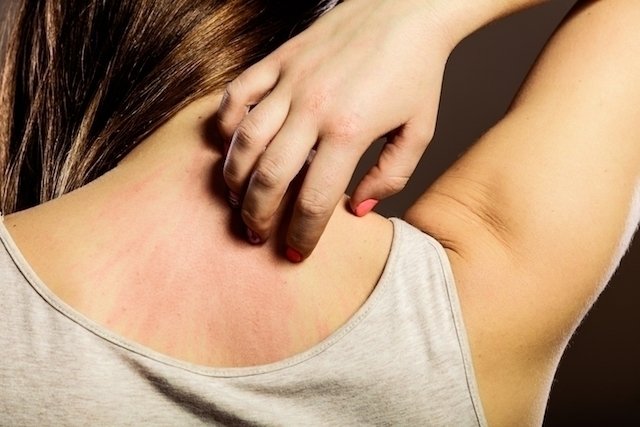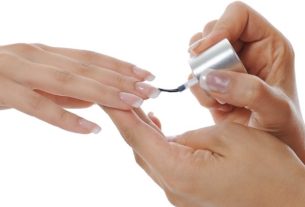The allergy causes symptoms such as itching and redness of the skin, swelling in the mouth, vomiting, coughing and shortness of breath, and symptoms may also vary according to the area of the body affected and the type of allergen.
Allergy symptoms arise when the body comes into contact with a substance capable of triggering inflammation in the body and an exaggerated response of the immune system to dust, pollen, medicines, perfumes or foods, mainly peanuts, eggs, milk and derivatives.
Read too: Allergy: what it is, types, symptoms and treatment
Allergy treatment is carried out according to the guidance of an allergist or general practitioner and involves the use of antihistamines and corticosteroids, in some cases. Furthermore, in more serious cases, the administration of injectable adrenaline may be necessary.

Food allergy symptoms
The main symptoms of food allergies are:
- Tingling or itching in the mouth;
- Itchy, red and rough skin;
- Swelling and itching of the neck, lips, face or tongue;
- Dor abdominal;
- Diarrhea;
- Nausea or vomiting;
- Feeling of discomfort in the throat;
- Shortness of breath and difficulty breathing;
- Hoarseness.
These symptoms occur after eating allergenic foods, such as strawberries, shellfish, peanuts, milk or dairy products, for example.
In more serious cases, or when treatment is not started as quickly as possible, the patient may develop symptoms of anaphylaxis, which is a serious condition that must be treated in hospital and includes symptoms such as difficulty breathing, swelling in the throat, sudden drop in blood pressure or fainting. Know how to identify anaphylaxis and what to do.
Treatment for food allergies depends on the severity of the symptoms present, as they can vary from one person to another. In general, to treat this allergy, the doctor may recommend the use of antihistamines or corticosteroids prescribed by the doctor to alleviate the symptoms, in addition to avoiding the consumption of the food responsible for the allergy.
Skin allergy symptoms
The main symptoms of skin allergies are:
- Bumps on the skin;
- Intense itching;
- Redness;
- Red spots on the skin;
- Dryness of the site;
- Burning and burning sensation;
- Change in skin sensitivity;
- Skin swelling.
Skin allergy symptoms may appear a few minutes or hours after contact with the allergen, and it is important to wash your skin with water or neutral soap while symptoms persist.
This type of allergy is common in cases where there is an allergy to medications, insect bites, animals or substances, such as perfumes, nickel, nail polish or latex, but it can also be caused by the release of histamine, originating from a respiratory or food allergy.
Treatment must be carried out by an allergist who may recommend the use of creams with corticosteroids or immunosuppressants, and anti-allergy medications such as loratadine, cetirizine or hydroxyzine.
Respiratory allergy symptoms
Respiratory allergy symptoms are:
- Nasal secretion, making the nose blocked;
- Itchy nose, eyes and throat;
- Constant sneezing;
- Red nose;
- Dry cough;
- Difficulty breathing;
- Redness in the eyes and tearing;
- Headaches.
Respiratory allergies can arise when the airways come into contact with substances such as dust, mold or fur from cats or other animals, worsening diseases such as rhinitis, asthma or sinusitis.
To treat respiratory allergies correctly, the allergist must identify the cause and, therefore, recommend the use of anti-allergy medications. Furthermore, it is important to take into account some precautions that facilitate the person’s recovery and help prevent other symptom attacks, such as keeping the house clean and vacuumed, to avoid accumulating dust, and drinking plenty of water daily.
Drug allergy symptoms
Drug allergy causes symptoms similar to other types of allergies, such as:
- Red dots on the skin;
- Itch;
- Swelling of the skin;
- Difficulty breathing;
- Diarrhea;
- Headache;
- Intestinal cramps.
These symptoms appear when the medication is started, and improve when treatment is stopped. After identifying a medication that caused an allergic reaction, it is important to always inform the doctor of the name before any treatment or surgery, to prevent the problem from recurring.
Online symptom test
To find out the chances of having an allergy, please select the symptoms you present:
This test is a tool that serves as a means of guidance only. Therefore, it is not intended to provide a diagnosis and does not replace consultation with an allergist, immunologist or general practitioner.
Bibliography
- MAYO CLINIC. Nickel allergy. Available at: <https://www.mayoclinic.org/diseases-conditions/nickel-allergy/diagnosis-treatment/drc-20351534>. Accessed on April 14, 2023
- REBELYTICS RESEARCH & DEVELOPMENT. Low Nickel Diet. Available at: <https://rebelytics.ca/LND/lowNiDiet_r7.0_summaryTables.pdf>. Access on Apr 14, 2023
- INSTITUTE FOR SAFE PRACTICES IN THE USE OF MEDICAMENOTS. Preventing medication errors associated with allergic reactions to medications. 2019. Available at: <https://www.ismp-brasil.org/site/wp-content/uploads/2019/11/BOLETIM_ISMP_OUTUBRO_ALERGIAS.pdf>. Accessed on March 22, 2022
- BULLETIN FROM THE MEDICINE INFORMATION CENTER. Anaphylactic drug reactions. 219. Available at: <https://www.crf-pr.org.br/uploads/revista/38460/qhkVqDEHjykO7_spOL-_R9REqueh1FwL.pdf>. Accessed on March 22, 2022
- BERGMAN D. et. to the.. Low Nickel Diet: A Patient-Centered Review. Clinical & Experimental DermatologyResearch. Vol.7. 3.ed; 2016
- SHARMA, Ashimav D . Low Nickel Diet in Dermatology. Indian Journal of Dermatology. Vol.58. 3.ed; 240, 2013
- PORTUGUESE SOCIETY OF ALLERGOLOGY AND CLINICAL IMMUNOLOGY. Nickel sulfate hexahydrate. . Accessed on March 17, 2020

Sign up for our newsletter and stay up to date with exclusive news
that can transform your routine!
Warning: Undefined array key "title" in /home/storelat/public_html/wp-content/plugins/link-whisper-premium/templates/frontend/related-posts.php on line 12
Warning: Undefined array key "title_tag" in /home/storelat/public_html/wp-content/plugins/link-whisper-premium/templates/frontend/related-posts.php on line 13



